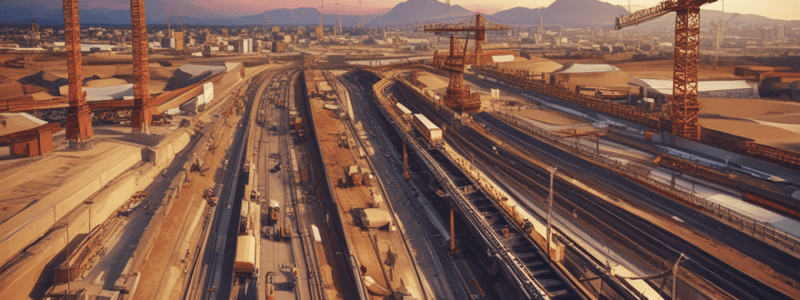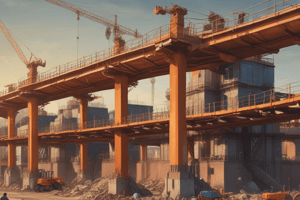Podcast
Questions and Answers
What is the topic of Annexure 5-A1?
What is the topic of Annexure 5-A1?
- Preparation of the Preliminary Works Programme (correct)
- Code Rules for Estimates
- Grouping of Works
- Test of Remunerativeness
What is the focus of Section 3 of Chapter 6?
What is the focus of Section 3 of Chapter 6?
- Protective Clothing
- Surveys
- Tools and Plants
- Imprest Stores (correct)
What is the purpose of Annexure 6-A2?
What is the purpose of Annexure 6-A2?
- Guidelines for Preparation of Indents
- Daily Material Transaction Register (DMTR)
- Materials At-Site Account
- Tools and Plant (correct)
What is the topic of Section 5 of Chapter 6?
What is the topic of Section 5 of Chapter 6?
What is the purpose of Annexure 6-A4?
What is the purpose of Annexure 6-A4?
What is the topic of Section 2 of Chapter 6?
What is the topic of Section 2 of Chapter 6?
What is the purpose of Annexure 5-A3?
What is the purpose of Annexure 5-A3?
What is the topic of Annexure 6-A5?
What is the topic of Annexure 6-A5?
What is the responsibility of SSE(Signal)/Incharge in regard to tools and plant?
What is the responsibility of SSE(Signal)/Incharge in regard to tools and plant?
What should SSE(Signal)/Incharge, Sectional SSE/JE(Signal) and Technicians(Signal) do to ensure safety of staff and equipment?
What should SSE(Signal)/Incharge, Sectional SSE/JE(Signal) and Technicians(Signal) do to ensure safety of staff and equipment?
What should be done with unserviceable and defective tools?
What should be done with unserviceable and defective tools?
What should each SSE(Signal)/Incharge, Sectional SSE/JE(Signal) have in their possession while on duty?
What should each SSE(Signal)/Incharge, Sectional SSE/JE(Signal) have in their possession while on duty?
Where can the procedures to be followed in regard to accidents be found?
Where can the procedures to be followed in regard to accidents be found?
Why should SSE(Signal)/Incharge, Sectional SSE/JE(Signal) and Technicians(Signal) take all precautions to ensure safety of staff and equipment?
Why should SSE(Signal)/Incharge, Sectional SSE/JE(Signal) and Technicians(Signal) take all precautions to ensure safety of staff and equipment?
What should be done in regard to accidents?
What should be done in regard to accidents?
Which of the following is an extra Divisional Organisation of the Signal and Telecommunication Department on the Railways?
Which of the following is an extra Divisional Organisation of the Signal and Telecommunication Department on the Railways?
What should SSE(Signal)/Incharge ensure?
What should SSE(Signal)/Incharge ensure?
Who is responsible for the efficient functioning of the extra Divisional Organisations?
Who is responsible for the efficient functioning of the extra Divisional Organisations?
What determines the strength of officers in the Headquarters Office of Principal Chief Signal and Telecommunication Engineer?
What determines the strength of officers in the Headquarters Office of Principal Chief Signal and Telecommunication Engineer?
What are the designations of S&T officers and staff dependent on?
What are the designations of S&T officers and staff dependent on?
Which of the following is not an extra Divisional Organisation of the Signal and Telecommunication Department on the Railways?
Which of the following is not an extra Divisional Organisation of the Signal and Telecommunication Department on the Railways?
Who is the controlling officer of the extra Divisional Organisations responsible to?
Who is the controlling officer of the extra Divisional Organisations responsible to?
What is the role of the team of officers in various grades?
What is the role of the team of officers in various grades?
Which of the following is a typical designation of S&T officers and staff?
Which of the following is a typical designation of S&T officers and staff?
What is the responsibility of the Sectional SSE/JE(Signal) regarding failures on his section?
What is the responsibility of the Sectional SSE/JE(Signal) regarding failures on his section?
What is the purpose of the 'Cause wise Analysis Of Signal Incidences' report?
What is the purpose of the 'Cause wise Analysis Of Signal Incidences' report?
Who is responsible for monitoring Datalogger exception reports?
Who is responsible for monitoring Datalogger exception reports?
What is the responsibility of the Sectional SSE/JE(Signal) regarding rules and technical work?
What is the responsibility of the Sectional SSE/JE(Signal) regarding rules and technical work?
What is the purpose of the daily inspection by the Sectional SSE/JE(Signal)?
What is the purpose of the daily inspection by the Sectional SSE/JE(Signal)?
What is the purpose of the Signal Engineering Manuals mentioned in Section 3.5.2?
What is the purpose of the Signal Engineering Manuals mentioned in Section 3.5.2?
What is the expected level of familiarity with the rules and regulations for the SSE(Signal)/incharge?
What is the expected level of familiarity with the rules and regulations for the SSE(Signal)/incharge?
What is the responsibility of the Sectional SSE/JE(Signal) regarding new installations?
What is the responsibility of the Sectional SSE/JE(Signal) regarding new installations?
What should the SSE(Signal)/incharge ensure for the staff under their charge?
What should the SSE(Signal)/incharge ensure for the staff under their charge?
What should the Sectional SSE/JE(Signal) do with failures pertaining to other departments?
What should the Sectional SSE/JE(Signal) do with failures pertaining to other departments?
What is the condition of all Warning Boards and other boards maintained by the Signal department?
What is the condition of all Warning Boards and other boards maintained by the Signal department?
What is the purpose of the list of publications mentioned in Section 3.5.2?
What is the purpose of the list of publications mentioned in Section 3.5.2?
What is included in the list of items the SSE(Signal) should have when accompanying an important inspection?
What is included in the list of items the SSE(Signal) should have when accompanying an important inspection?
What is the purpose of the Cable Route Plans mentioned in Section 3.5.3?
What is the purpose of the Cable Route Plans mentioned in Section 3.5.3?
What should the SSE(Signal)/incharge ensure is kept updated with all the addenda and corrigenda slips issued from time to time?
What should the SSE(Signal)/incharge ensure is kept updated with all the addenda and corrigenda slips issued from time to time?
What is the purpose of the Track Circuit Bonding Plan mentioned in Section 3.5.3?
What is the purpose of the Track Circuit Bonding Plan mentioned in Section 3.5.3?
What is the primary consideration while laying telecom lines in railway departments?
What is the primary consideration while laying telecom lines in railway departments?
What type of cable is used for control circuits and block interfaces?
What type of cable is used for control circuits and block interfaces?
What is the nominal diameter of the conductor used in Twisted Pair Switch Board Cable?
What is the nominal diameter of the conductor used in Twisted Pair Switch Board Cable?
What is the purpose of providing spare capacity in telecom lines?
What is the purpose of providing spare capacity in telecom lines?
What type of insulation is used in Quad Cable?
What type of insulation is used in Quad Cable?
What is the nominal diameter of the conductor used in Quad Cable for longer block sections?
What is the nominal diameter of the conductor used in Quad Cable for longer block sections?
What is the minimum distance for which 0.63 mm cond. Dia. twisted Pair PIJF cable is used?
What is the minimum distance for which 0.63 mm cond. Dia. twisted Pair PIJF cable is used?
What type of cable is recommended for outdoor underground laying?
What type of cable is recommended for outdoor underground laying?
What is the size of the conductor used for local subscriber's connections in a building?
What is the size of the conductor used for local subscriber's connections in a building?
What is the specification of a typical telephone exchange cable?
What is the specification of a typical telephone exchange cable?
What type of insulation is used for indoor cables?
What type of insulation is used for indoor cables?
Why should RE cable containing paper as well as polythene insulated copper quads be replaced?
Why should RE cable containing paper as well as polythene insulated copper quads be replaced?
What should be inspected before laying the cable?
What should be inspected before laying the cable?
Why is it important to minimize electro-static and electro-magnetic induction in telephone cables?
Why is it important to minimize electro-static and electro-magnetic induction in telephone cables?
What should be done with the cable drum when laying out the cable?
What should be done with the cable drum when laying out the cable?
What should be present while excavating earth for trenches or making other pits?
What should be present while excavating earth for trenches or making other pits?
What is the purpose of twisting pairs of conductors in telephone cables?
What is the purpose of twisting pairs of conductors in telephone cables?
In 'Quad' type of cables, what forms one circuit?
In 'Quad' type of cables, what forms one circuit?
What should be used to terminate PIJF cables of various sizes?
What should be used to terminate PIJF cables of various sizes?
What should be used to joint armoured PIJF cables?
What should be used to joint armoured PIJF cables?
Who should carry out jointing of PIJF cables?
Who should carry out jointing of PIJF cables?
What should be submitted to the concerned Railway officials to ensure quality of laying and jointing of cables?
What should be submitted to the concerned Railway officials to ensure quality of laying and jointing of cables?
Where should telecom cables be laid in busy areas?
Where should telecom cables be laid in busy areas?
What should be used for jointing quad cables?
What should be used for jointing quad cables?
Who should supervise the cable laying and jointing work?
Who should supervise the cable laying and jointing work?
Flashcards are hidden until you start studying
Study Notes
Organisational Structure
- Extra Divisional Organisations of the Signal and Telecommunication Department on the Railways include:
- Signal and Telecommunication Workshops
- Signal and Telecommunication Training School/Centre
- Field Units of Construction Organisation including Project/Works/CORE
- Any other unit designated by the Railway
- Each of these Organisations is under the control of an officer of appropriate grade responsible for its efficient functioning
Officers
- Strength of officers in the Headquarters Office of Principal Chief Signal and Telecommunication Engineer, Chief Signal and Telecommunication Engineer (Construction), Divisional offices and in extra divisional organisations is generally in accordance with extant guidelines of Railway Board
- Officer's designations and abbreviations are provided for various posts of S&T officers and staff
Attending to Failures/Incidences
- The Sectional SSE/JE (Signal) shall monitor daily all failures on his section and investigate serious failures
- Each Sectional SSE/JE (Signal) shall summarise the failure reports received from each Technician (Signal) and submit monthly 'Cause wise Analysis Of Signal Incidences' to the Sr. Divisional Signal and Telecommunication Engineer
Competency in Rules and Technical Work
- Sectional SSE/JE (Signal) shall be fully conversant with rules and regulations, instructions, procedures, and practices of installation, operation, and maintenance of all installations under their charge
- They shall be competent to carry out under open line working conditions additions and alterations to existing installations and circuits, as well as new installations
Accidents
- SSE (Signal)/Incharge, Sectional SSE/JE (Signal), and Technicians (Signal) are responsible for supervision of labour and shall take all precautions to ensure safety of staff and equipment
- They shall observe instructions contained in Zonal/Divisional Disaster Management Plan and use safety appliances provided
General Responsibilities and Duties
- Each SSE (Signal)/Incharge shall be responsible for the issue of proper tools and other equipment to Technicians (Signal) and artisans under them and for ensuring that these are kept in proper working order
- They shall have in their possession an latest copy of various books of reference, including General and Subsidiary Rules, Signal Engineering Manuals, and others
- They shall be well acquainted with all the rules concerned and ensure that all staff under their charge are well acquainted with these rules and regulations to the extent applicable to them
Line Plant Systems – Underground Copper Cable
System
- Railway departmental telecommunication lines are laid underground between railway offices, colonies, workshops, station yards, and block sections alongside the track.
- Spare capacity should be kept in mind for future extensions or extra connections without major alterations to the existing circuits or reconstruction of the entire alignment.
Line Plant (Underground Copper Cables)
Types & Performance Parameters
- Quad cables (0.9 or 1.4 mm conductor dia) are used for control circuits and block interfaces.
- Multi-pair cables (from 10 pairs to 200) with 0.5 mm/0.63 mm/0.9 mm conductor dia are used for exchange subscriber lines or branch cables.
- Twisted Pair Switch Board Cables (0.5 mm / 0.6 mm copper conductor dia) are used for indoor applications such as distribution to telephone subscribers in a building.
Sizes of Cables
- Outdoor underground cables: 0.5 mm cond. dia. twisted pair PIJF for subscriber connections up to 5 km, and 0.63 mm cond. dia. twisted pair PIJF for connections up to 10 km.
- Indoor cables: 0.5 mm ATC Switch Board cable for local subscriber connections, and 0.6 mm ATC Switch Board cable for trunk connections.
Testing Cable Before Laying
- Cables should be tested for insulation and continuity of cores before laying.
- Bedding and armouring of the cable should be inspected for damage during transit or storage.
Laying Out the Cable
- Cable drums are mounted on cable-wheels, and the cable is guided into the trench carefully to avoid damage.
- In areas where wheels are not available, the drum is mounted on an axle, and the cable is laid out and carried by labourers.
General
- The Permanent Way Inspector or representative should be present during excavation and installation of cable junction boxes.
- In 'Quad' type cables, conductors diagonally opposite form one circuit.
- Electro-static and electro-magnetic induction between conductors should be minimized by a lead or aluminium sheath and twisted pairs.
Cable Termination
- Cables can be terminated using DP Box of approved type or direct termination.
- PIJF cables of various sizes should be terminated through DP Box of approved type.
Jointing of PIJF Cable
- Jointing should be done by a skilled and experienced person using the correct RDSO specified jointing kit.
- The entire cable laying and jointing should be done under close supervision of telecom staff.
- Thermo shrinkable jointing material should be used for jointing armoured PIJF cable with thermo shrinkable jointing technique.
Studying That Suits You
Use AI to generate personalized quizzes and flashcards to suit your learning preferences.





